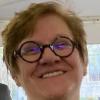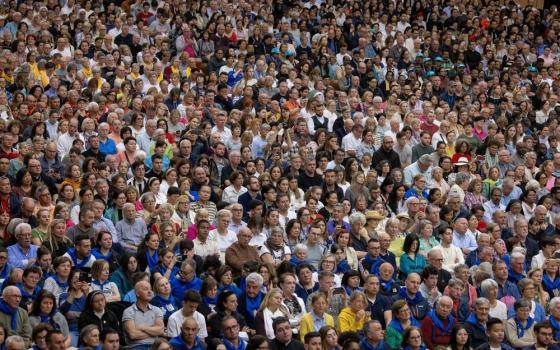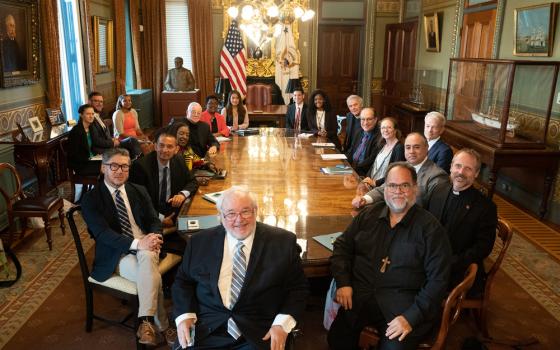Three students active with University of San Diego’s Changemaker Hub, a partner of USD's Food Studies Initiative, pose at Aromas, a USD campus coffee shop, during April 2023's trial run of an oat milk default in drinks ordered at the café. (Courtesy of Aaron Gross)
"Despite all attempts to deny, conceal, gloss over or relativize the issue," Pope Francis writes in his recent exhortation, Laudate Deum, "the signs of climate change are here and increasingly evident."
Climate change denial has made the pope's message on the climate crisis ever more urgent — and at the University of San Diego, in the California city of the same name, more than 25 faculty members have issued a statement in solidarity with the pope, challenging their campus to improve the climate impact and sustainability of its food systems.
"We call upon our own community at the University of San Diego and all institutions inspired by Pope Francis' message to bring these values into practice," their letter — dated Oct. 11 and titled "A Call to Respond to Laudate Deum" — reads, "by working to create a more just, humane, and sustainable food system — one capable of being part of the solution to climate change — starting with the food we serve in our own institutions."
It continues by calling on Catholic institutions, including USD, to
embark on the task of changing the food they serve to dramatically decrease its carbon footprint in line with the best science, to steadily reduce dependence on the factory farming of animals, and to support more ethical supply chains. That we cannot instantly realize this vision given the deep problems in agriculture today is a truism, but it is equally a truism that we can sincerely begin the task. Anything less makes a mockery of Pope Francis' call to fraternity and communion with each other and our "fellow creatures."
USD is already a Laudato Si' campus — one of the first in the world. To receive that designation from the Laudato Si' Action Platform, colleges must comprehensively evaluate their environmental and sustainability programs, then develop and implement initiatives addressing goals outlined by Francis.
"Since the publication of Pope Francis' encyclical Laudato Si', the University of San Diego (USD) has taken a community-wide, holistic approach to care of our Common Home," the University of San Diego said in an emailed statement to EarthBeat. "As part of that commitment, USD was one of the first universities to change its investment policies to align with Laudato Si' values and pledged to achieve carbon neutrality by 2035."
'We can't change our actions without changing the ways we're interpreting and interacting with the world.'
—Mary Doak
Still, some knew more could be done, including Aaron Gross, co-chair of USD's Food Studies Initiative and a professor of theology and religious studies.
When FSI began in 2020, it was designed to "bring together longstanding faculty strengths at USD that utilize food as a vehicle for science education, for advancing more ethical supply chains, and for socially engaged scholarship in the humanities and social sciences," according to USD News Center. Another goal for FSI, said Gross, was to "work with dining services, and develop a synergistic relationship."
Gross said FSI wanted to have conversations that "center on the way in which our food system can be a vehicle for justice, or part of the problem."
The community response to FSI was "tons of energy on campus; just lots of support from faculty and students; a lot of amazing things happening in the classroom," Gross told EarthBeat. But, "in terms of getting changes in how food is served," he said, "we've kind of hit a wall."
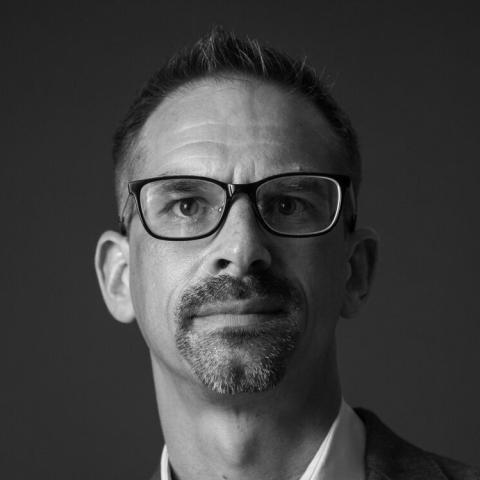
Aaron Gross is co-chair of the University of San Diego's Food Studies Initiative and a professor of theology and religious studies. (Courtesy of Aaron Gross)
Recently, a modest proposal involved offering non-dairy milk as the default in the campus coffeehouse, Aromas, which would positively affect both sustainability and inclusion. A monthlong pilot program began in April 2022, with the goal of a semester-long pilot during the fall 2023 semester.
"And dining services said no" to moving forward with the semester-long pilot, Gross said, "giving the reason that the oat milk default has not increased sales." For FSI and Gross, that was "disappointing."
While non-dairy milk alternatives are not the default option, USD's emailed statement said, "USD Dining offers a variety of plant-based milks and dairy milks on campus," including "almond milk, half and half, low-fat milk, oat milk, soy milk, and whole milk,"and even "coconut and pea milk" in some locations.
Gross said it was "energizing to see Laudate Deum push so strongly on the details of taking climate change seriously." Freshly inspired by Francis' words, Gross said, "I felt, 'Well, we can win this. We've got the pope at our back.' "
Gross and two USD colleagues collaborated on "A Call to Respond to Laudate Deum." The missive was circulated to the FSI contact list; the executive board of the Environmental Integration Lab; the theology, religious studies and philosophy faculty; and the university's administrative office.
Particularly concerning for Gross is USD's AASHE (Association for the Advancement of Sustainability in Higher Education) rating. "We have a 'gold' rating with them right now. But on food, we are rated less than one point out of six," Gross said. "We can just do so much better."
That may take time. Gross thinks FSI's success depends on a combination of community support and a change of priorities by USD administration and dining services.
"Right now, the way it works — and this is exactly what we heard from dining services — is even when there's tremendous will and enthusiasm to change, a lot of these decisions are made on very narrow financial metrics."
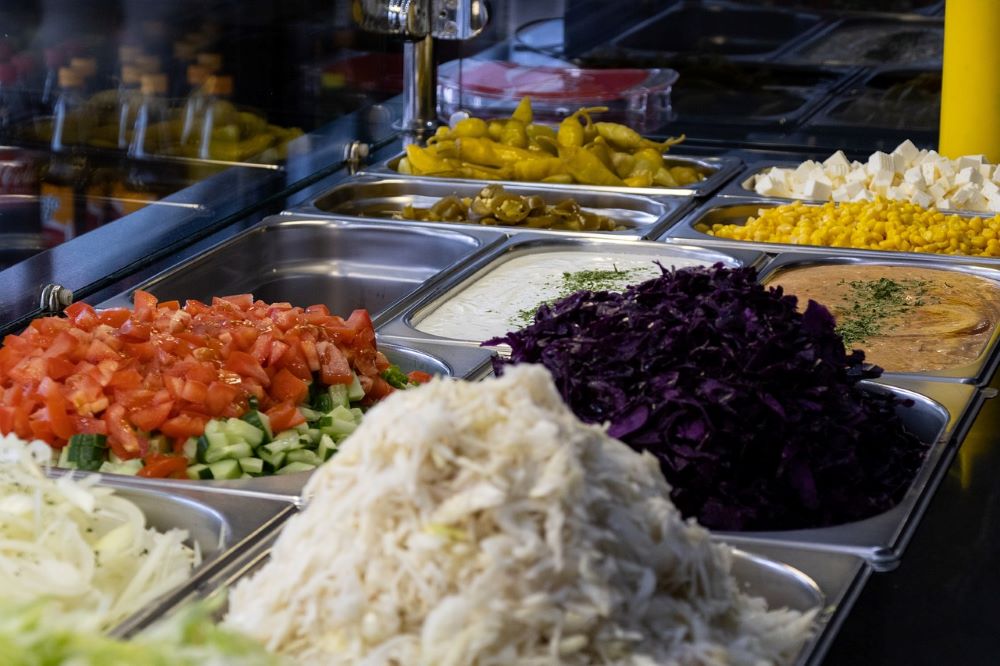
Vegetables and tofu are seen at a cafeteria serving station. (Pixabay/Mirko Fabian)
In the university's statement, they said, "USD Dining considers the environmental impacts of their decisions and has taken significant strides to be mindful of our environment. USD Dining is proud of its sustainability efforts."
In announcing in 2021 that USD would become a Laudato Si' college, the university's president, James T. Harris III, shared that he eats a plant-based diet, saying "I felt it was the best thing for me to do to live that example."
USD's statement said the university has "worked to create a more sustainable dining program on campus by carefully constructing its menus, having strategic purchasing practices, reducing dining waste, finding ways to divert food waste from landfills" and more.
According to a Sustainability Scorecard used by the university, USD Dining services utilizes 100% certified humane cage-free eggs and liquid eggs; 85% chicken and 92% turkey with reduced antibiotics; 100% fluid milk and 98% yogurt free of artificial growth hormones; 100% seafood from sustainable sources; and 92% eco/fair trade certified coffee.
Other food systems sustainability efforts include a BioHiTech composter, used since 2009 to turn food waste into grey water; reusable to-go containers for food and beverages; vegetarian and vegan options throughout campus dining locations; and training with the Culinary Institute of America to incorporate more plant-based ingredients into USD menus.
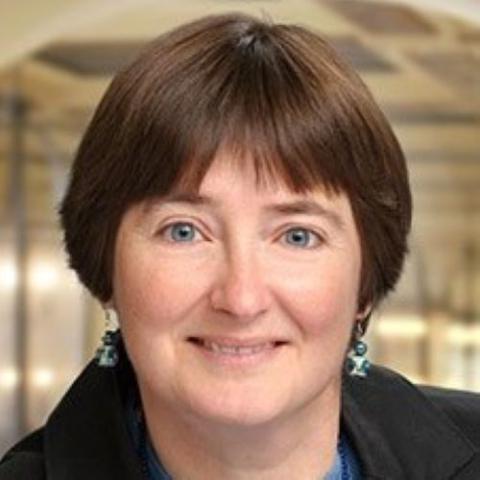
Mary Doak is a professor of theology and religious studies at the University of San Diego, the Food Studies Initiative theological advisor and the first signer of "A Call to Respond to Laudate Deum." (Courtesy of Mary Doak)
USD's statement further noted that "A Call to Respond to Laudate Deum" is not solely concerned with USD, "but all institutions inspired by Laudate Deum 'to create a more just, humane and sustainable food system.'"
Mary Doak — a professor of theology and religious studies, the Food Studies Initiative theological adviser and the first signer of "A Call to Respond to Laudate Deum" — said Francis is "definitely calling us to take action; this is a climate crisis. And he's also still reminding us that the ways we think and interact with the world — our values; our cultural assumptions — have to be changed."
"We can't change our actions without changing the ways we're interpreting and interacting with the world," said Doak.
Advertisement
The scale of change needed globally can be daunting, said another of the letter's signatories, John Millspaugh, a Unitarian Universalist minister and the FSI program director.
"I think one thing that often prevents individuals and institutions from taking action is that when facing a problem as vast in scope as the climate crisis, it can feel like the actions of one person, or one institution, or even one city or one nation, do not matter," said Millspaugh.
"But when it comes to climate change, the opposite is true. Every fraction of a degree of temperature rise in the decades ahead will have consequences, particularly for the world's most vulnerable," Millspaugh said.
"So every action matters; every bit of climate change mitigated matters — and every meal matters."




